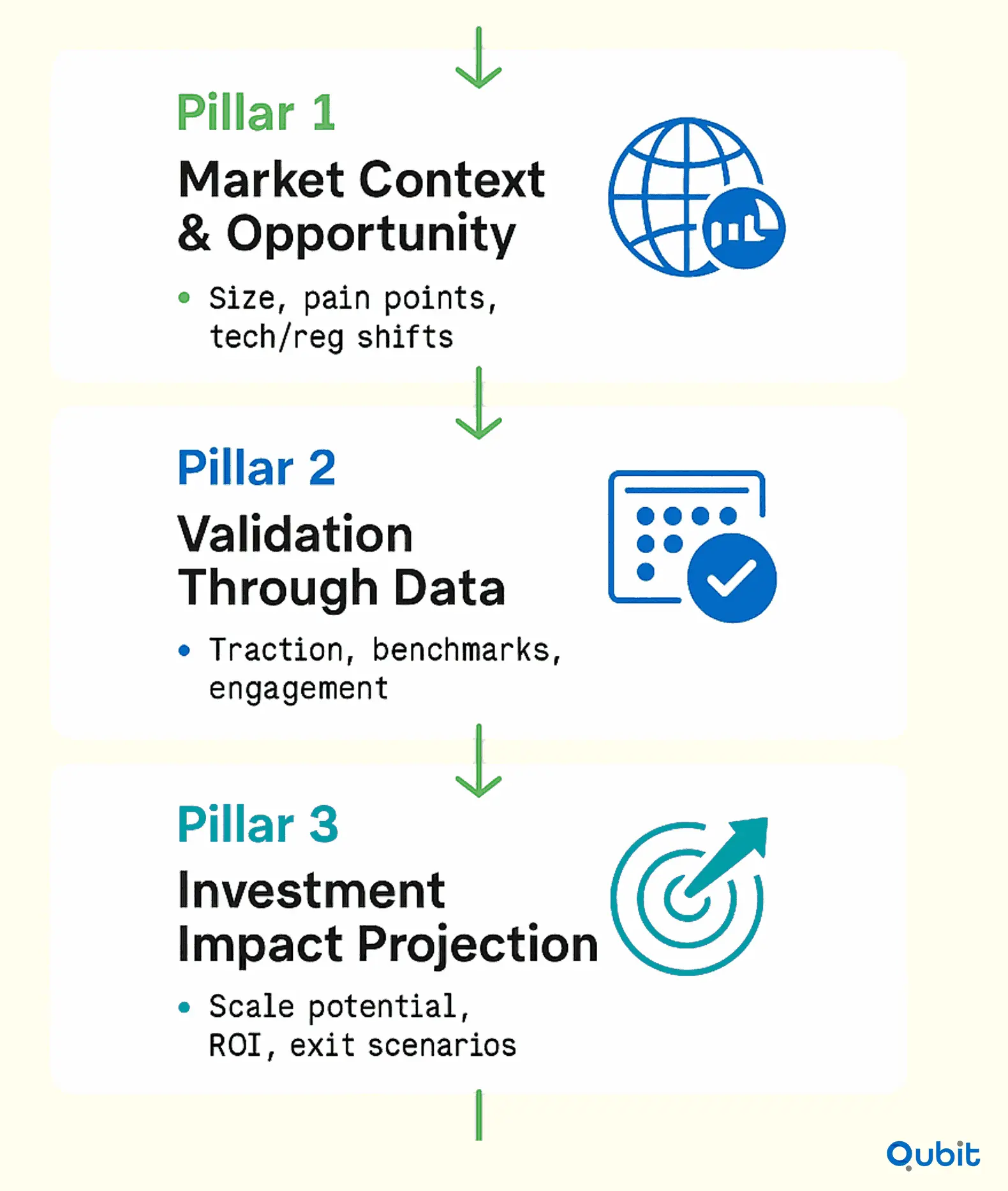Data storytelling is the bridge between raw numbers and compelling investor narratives. In the property market, where decisions hinge on clarity and foresight, transforming property insights into actionable stories is invaluable. Investors are no longer swayed by spreadsheets alone, they seek context, trends, and the "why" behind the data.
For PropTech professionals, mastering this skill is essential. Your narrative on property insights is complemented by the proptech pitch deck best practices, which offer detailed perspectives on structuring a compelling investment presentation. Together, these tools empower you to present data in a way that resonates with stakeholders.
This blog explores how data storytelling transforms complex property data into investor gold. Let’s dive into the strategies and insights that make this possible.
Why Data Storytelling Matters for Early-Stage PropTech Founders
1. Enhanced Credibility and Trust
Data storytelling adds credibility while narratives provide context and meaning, resulting in a well-rounded and trustworthy portrayal of your work. For early-stage founders who lack extensive customer testimonials or market validation, effective data storytelling becomes crucial for establishing legitimacy.
2. Emotional Connection with Investors
A well-crafted data story can capture investor attention and keep them engaged unlike dry statistics and figures. By framing property market data within compelling narratives, founders can make their solutions more relatable and memorable, creating the emotional connection that motivates investment decisions.
3. Bridging the Data-Action Gap
One of the key benefits of data storytelling is its ability to bridge the gap between data and action. While market analysis can provide valuable insights, it's often challenging to translate these insights into practical investment opportunities. Data storytelling helps overcome this challenge by presenting information in a way that's not only clear and compelling but also actionable for investors.
4. Competitive Differentiation
In a crowded PropTech market, storytelling helps startups differentiate their brand. By weaving unique datasets into compelling narratives, early-stage founders can gain investor attention, build credibility, and create memorable presentations that stand out from competitors.
Framework for Effective PropTech Data Storytelling

The Three-Pillar Structure
Successful data storytelling for PropTech fundraising rests on three foundational elements:
Pillar 1: Market Context and Opportunity
Start by establishing the current situation in your specific PropTech vertical. Use market data to paint a picture of:
- Market size and growth projections
- Current pain points and inefficiencies
- Regulatory or technological shifts creating opportunity
Pillar 2: Solution Validation Through Data
Present your journey toward a better future by demonstrating:
- Customer traction metrics that show demand
- Operational efficiency improvements
- Technology performance benchmarks
- User engagement and retention data
Pillar 3: Investment Impact Projection
Conclude with the desired future state showing:
- Scalability potential backed by data
- Revenue projections with clear assumptions
- Market penetration possibilities
- Exit opportunity indicators
Essential Data Categories for PropTech Founders
| Data Category | Key Metrics | Investor Appeal |
|---|---|---|
| Market Traction | User acquisition rate, Revenue growth, Customer retention | Demonstrates product-market fit |
| Operational Efficiency | Cost reduction percentage, Time savings, Process automation impact | Shows scalability potential |
| Technology Performance | System uptime, Processing speed, Accuracy improvements | Validates technical differentiation |
| Financial Health | Unit economics, Burn rate, Revenue per customer | Indicates business sustainability |
Data Storytelling Strategies
Transforming raw property data into compelling narratives is a game-changer for PropTech startups aiming to attract investor interest. Emerging research underscores the importance of data storytelling in bridging the gap between complex analytics and actionable insights. By combining statistical trends with narrative techniques, startups can craft persuasive stories that resonate with investors and highlight market opportunities.
The Role of Market Data in Investor Engagement
Data storytelling thrives on robust market insights. For instance, the North America PropTech market report reveals the region's dominance in PropTech innovation, offering a wealth of statistical data to support investment pitches. Similarly, the Global real estate market growth outlook highlights steady growth trends, emphasizing the long-term potential of PropTech solutions. These insights provide the foundation for crafting narratives that align with investor priorities.
Actionable Strategies for PropTech Startups
Integrate Big Data Analytics
Big Data analytics in PropTech is revolutionizing how startups present their value propositions. By analyzing property data trends, startups can identify patterns that appeal to investors. Learn more about this approach through the Big Data analytics in PropTech resource.Structure Data Stories Effectively
A well-organized data story is essential for clarity and impact. Refer to these tips on structuring a data story to ensure your narrative flows logically and highlights key investment opportunities.Highlight ROI with Demonstration Platforms
Demonstrating tangible ROI is crucial for investor confidence. Tools like the PropTech IQ ROI demonstration platform help startups showcase measurable outcomes, making their pitches more compelling.Incorporate Emerging Technologies
Investors are drawn to innovation. Exploring emerging technologies in PropTech, such as AI-driven solutions, can position your startup as a forward-thinking player in the market.
Trends Shaping PropTech Narratives
The PropTech ecosystem is evolving rapidly, with trends like the datafication of real estate and AI-powered solutions gaining traction. For example, Prop-AI's vision and mission statement illustrates how artificial intelligence is reshaping property management and investor engagement. By aligning your storytelling with these trends, you can demonstrate your startup's relevance and adaptability.
For a broader perspective on funding strategies, consult the proptech fundraising guide, which situates data storytelling within the larger ecosystem of PropTech investment strategies.
Common Pitfalls to Avoid
1. Data Overload
Resist the temptation to include every metric you've collected. Focus on data that directly supports your investment thesis and fundraising goals.
2. Lack of Context
Raw numbers without interpretation lose impact. Always explain what the data means for your business and why it matters to investors.
3. Unrealistic Projections
Ground your forward-looking statements in realistic assumptions based on current performance and market conditions. Investors can quickly identify unrealistic growth projections.
4. Generic Industry Data
While market size statistics are important, investors are more interested in your specific traction and how you're capturing market share within your niche.
Sector-Specific Data Storytelling Approaches
For Construction Tech Startups
Focus on operational efficiency metrics: project completion times, cost overruns reduction, safety incident decreases, and material waste elimination.
For Property Management Solutions
Emphasize tenant satisfaction data: response times, maintenance request completion rates, occupancy improvements, and revenue optimization metrics.
For Real Estate Fintech
Highlight transaction efficiency: processing speed improvements, fraud reduction rates, compliance automation benefits, and cost per transaction decreases.
For Smart Building Technology
Present sustainability impact data: energy consumption reduction, operational cost savings, tenant comfort improvements, and environmental compliance metrics.
Measuring Data Storytelling Success
Track the effectiveness of your data storytelling efforts through:
- Investor Engagement Metrics: Meeting requests, follow-up questions, due diligence invitations
- Pitch Conversion Rates: Percentage of presentations leading to term sheets
- Feedback Quality: Specific investor questions and comments about your data presentation
- Funding Timeline: Speed from initial pitch to funding completion
Building Investor-Specific Narratives
For Venture Capital Funds
Focus on scalability and market size: demonstrate how your data supports rapid growth potential and large market opportunity capture.
For Angel Investors
Emphasize problem-solution fit: use data to show clear market pain points and how your solution addresses real customer needs.
For Strategic Corporate Investors
Highlight integration potential: present data showing how your solution complements existing portfolio companies or corporate initiatives.
For Real Estate Investment Firms
Center on ROI and risk mitigation: use performance data to demonstrate investment returns and reduced operational risks.
Technology Integration for Data Storytelling
Visualization Platforms
Modern presentation tools enable dynamic data visualization that can adapt during investor meetings, allowing real-time exploration of metrics that interest specific investors.
Analytics Integration
Connect your presentation tools with live business analytics to demonstrate current performance and growth trends as they happen.
Mobile Optimization
Ensure your data stories translate effectively to mobile devices for follow-up discussions and investor review processes.
Conclusion
Transforming complex property data into compelling investor narratives is not just a skill—it's a strategic advantage. Throughout this blog, we’ve explored actionable strategies to simplify intricate data and craft presentations that resonate with investors. By focusing on clarity, relevance, and storytelling, you can turn raw information into a powerful tool for securing investment opportunities.
The importance of presenting data effectively cannot be overstated. A well-structured pitch deck can be the difference between gaining investor confidence and losing their interest. If you're ready to elevate your investor presentations, our Pitch Deck Creation service is designed to help you achieve just that. Let us assist you in creating impactful presentations that drive results.
Key Takeaways
- Data storytelling transforms raw property data into compelling narratives for investors.
- The PropTech market is experiencing significant growth and expanding investor interest.
- Integrating robust statistics and real-life case studies strengthens investor pitches.
- Avoid common pitfalls by emphasizing clarity, relevance, and precision in data presentation.
- Expert services from Qubit Capital can elevate your approach to investor outreach and pitch deck creation.
Frequently asked Questions
What is proptech and how does it impact real estate?
Proptech refers to the integration of technology into real estate, enhancing efficiency, management, and investment strategies across the sector.






